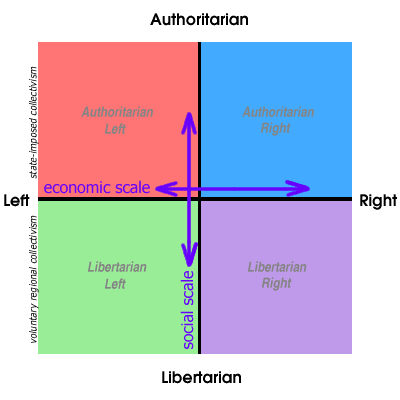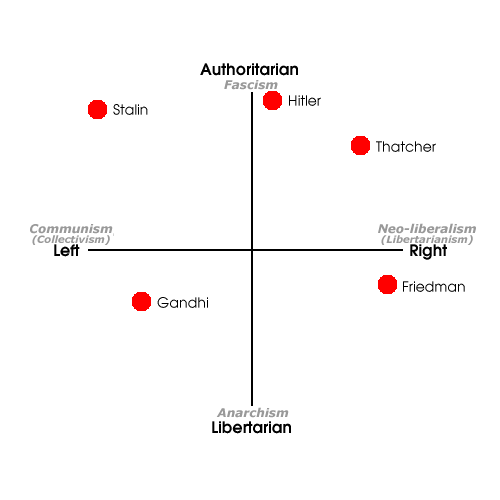- You can't be libertarian and left wing
This is almost exclusively an American response, overlooking the undoubtedly libertarian tradition of European anarcho-syndicalism. It was, after all, the important French anarchist thinker Proudhon who declared that property is theft.
On the other side of the Atlantic, the likes of Emma Goldman were identified as libertarians long before the term was adopted by some economic rightwingers. And what about the libertarian collectives of the mid-late 1800s and 1960s?
Americans like Noam Chomsky can claim the label 'libertarian socialist' with the same validity that Milton Friedman can be considered a 'libertarian capitalist'.
The assumption that Social Darwinism delivers more social freedom is questionable. The welfare states of, for example, Sweden and The Netherlands, abolished capital punishment decades ago and are at the forefront of progressive legislation for women, gays and ethnic minorities - not to mention anti-censorship. Such established social democracies consistently score highest in the widely respected Freedom House annual survey on civil liberties. Their detailed checklist can be viewed at
http://www.worldaudit.org/civillibs.htm . Such social developments would presumably be envied by genuine libertarians in socially conservative countries - even if their taxes are lower.
Interestingly, many economic libertarians express to us their support for or indifference towards capital punishment; yet the execution of certain citizens is a far stronger assertion of state power than taxation.
N.B. The death penalty is practised in all seriously authoritarian states. In Eastern Europe it was abolished with the fall of communism and adoption of democracy. The United States is the only western democracy where capital punishment is still practised.
- Where are the right-wing social libertarians on the international chart ?
It's a good question, and we'd like to include some, but we haven't found any among the biggest internationally-known players. It 's important to remember, though, that within each quadrant there are still very sizeable variables. Some figures on the right of the chart are only of a modest authoritarian tendency.
- Why is Hitler slightly right ? The Nazis were socialists, so they weren't fascists either.
Let's start with the second part first. Some respondents confuse Nazism, a political party platform, with fascism, which is a particular structure of government. Fascism legally sanctions the persecution of a particular group within the country - political, ethnic, religious - whatever. So within Nazism there are elements of fascism, as well as militarism, capitalism, socialism etc. To tar all socialists with the national socialist brush is as absurd as citing Bill Gates and Augusto Pinochet in the same breath as examples of free market capitalism.
Economically, Hitler was well to the right of Stalin. Post-war investigations led to a number of revelations about the cosy relationship between German corporations and the Reich. No such scandals subsequently surfaced in Russia, because Stalin had totally squashed the private sector. By contrast, once in power, the Nazis achieved rearmament through deficit spending. One of our respondents has correctly pointed out that they actively discouraged demand increases because they wanted infrastructure investment. Under the Reich, corporations were largely left to govern themselves, with the incentive that if they kept prices under control, they would be rewarded with government contracts. Hardly a socialist economic agenda !
But Nazi corporate ties extended well beyond Germany. It is an extraordinarily little known fact that in 1933 a cabal of Wall Street financiers and industrialists plotted an armed coup against President Roosevelt and the US Constitutional form of government. The coup planners - all of them deeply hostile to socialism - were enthusiastic supporters of German national socialism and Italian fascism. Details of the little publicised Congressional report on the failed coup may be read in
1000 Americans:The Real Rulers of the USA by George Seldes.
Fascism, according to the American Heritage Dictionary (1983) is
A system of government that exercises a dictatorship of the extreme right, typically through the merging of state and business leadership, together with belligerent nationalism. Italian philosopher Giovanni Gentile's entry in the Encyclopedia Italiana read:
Fascism should more appropriately be called corporatism because it is a merger of state and corporate power. No less an authority on fascism than Mussolini was so pleased with that definition that he later claimed credit for it.
Nevertheless, within certain US circles,the misconception remains that fascism is essentially left wing, and that the Nazis were socialists simply because of the "socialism" in their name. We wonder if respondents who insist on uncritically accepting the Nazis' cynical self-definition would be quite as eager to believe that the German Democratic Republic was democratic.
- How can I be in the same quadrant as Pol Pot/Hitler/Stalin ? I'm no Pol Pot/Hitler/Stalin !
The quadrants are not separate categories, but regions on a continuum. The fact that The Pope is in the same quadrant as Stalin does not make The Pope another Stalin. His closeness to the axes makes him a moderate, and therefore closer to Gandhi and Chirac, even though they are in different quadrants. Each quadrant contains enormous variability and can accommodate philanthropists and monsters, differing in the extremity of their views.
- You've got liberals on the right. Don't you know they're left ?
This response is exclusively American. Elsewhere neo-liberalism is understood in standard political science terminology - deriving from mid 19th Century Manchester Liberalism, which campaigned for free trade on behalf of the capitalist classes of manufacturers and industrialists. In other words, laissez-faire or economic libertarianism.
In the United States, "liberals" are understood to believe in leftish economic programmes such as welfare and publicly funded medical care, while also holding liberal social views on matters such as law and order, peace, sexuality, women's rights etc. The two don't necessarily go together.
Our Compass rightly separates them. Otherwise, how would you label someone like the late Senator Daniel Patrick Moynihan who, on the one hand, pleased the left by supporting strong economic safety nets for the underprivileged, but angered social liberals with his support for the Vietnam War, the Cold War and other key conservative causes ?
- Politics have moved, but you're still using the old economic parameters.
Some critics have argued that, because the universal political centre has moved to the right, our axes should correspondingly move to the right. This, however, would not indicate how far one way or the other society has shifted. It could not convey paradoxes such as the fact that, in the UK, New Labour occupies an economic position to the right of pre-Thatcher Conservatives. Where was the centre, for example, in Apartheid South Africa ? In Third Reich society, such a skewed analysis might show a Nazi opposed to the death chambers as representing liberal opinion.
Narrowing the standard political goalposts to accommodate merely the range of mainstream opinion within any given society at a given time is not only historically uninstructive; it is unscientific.
- Most governments and political figures are plotted on the right. Doesn't that mean that your centre is misplaced ?
The Political Compass chart represents the whole spectrum of political opinion, not simply the range within a particular nation or region. The timeless universal centre should not be confused with merely the present national average. The former is far more meaningful and informative. Where, for example, would the centre be within the political confines of Hitler's Germany, apartheid South Africa or the Soviet Union ? By showing the whole spectrum of political thought, we can indicate the width or narrowness of prevailing mainstream politics within any particular country. It also enables us to chart the drifts one way or another of various parties, governments and individuals.
Twenty-five years ago, social democracy was riding high in western Europe. A chart at that time would have shown a number of EU governments to the left of the centre. In our globalised age, however, the shift has been rightward, which accounts for the altogether different cluster that the contemporary chart depicts. In other words most democracies, either reluctantly or enthusiastically, have embraced neoliberalism (ie a right leaning economy) to a greater or lesser extent.
Curbs on civil liberties, rationalised by issues such as illegal immigration and terrorist threats, accounts for the concurrent drift upwards on the social scale.
- Why did you do this ? What's in it for you ?
As we explained in our introduction, it's a case of a journalist and an academic working on the inadequacies of simple left-right political identities.
We have no ideological or institutional baggage. The satisfaction has been in generating media discussion, and receiving thoughtful comments and so much enthusiasm from web visitors.



 . Nader means well, but couldn't lead a dog on a leash.... Paul and Barr have to much faith in humanity for a "good ole boy" "free for all" state run society not to co-exist with the Fed and expect greed, corruption, and cheap "slave" labor not to rear their ugly heads. In addition, those guys will have us running around in 18th century garb and hairpieces...
. Nader means well, but couldn't lead a dog on a leash.... Paul and Barr have to much faith in humanity for a "good ole boy" "free for all" state run society not to co-exist with the Fed and expect greed, corruption, and cheap "slave" labor not to rear their ugly heads. In addition, those guys will have us running around in 18th century garb and hairpieces... Whig-ger please ! No thanks. Don't tread on me....BTW...don't you maintenance tech guys still cling to your confederate gray shirts?
Whig-ger please ! No thanks. Don't tread on me....BTW...don't you maintenance tech guys still cling to your confederate gray shirts? . It is was it is
. It is was it is  .
.








 ....JK.....lol
....JK.....lol


....JK.....lol
I'm still standing.......
Care to go another round.....Best 2 out of 3....




